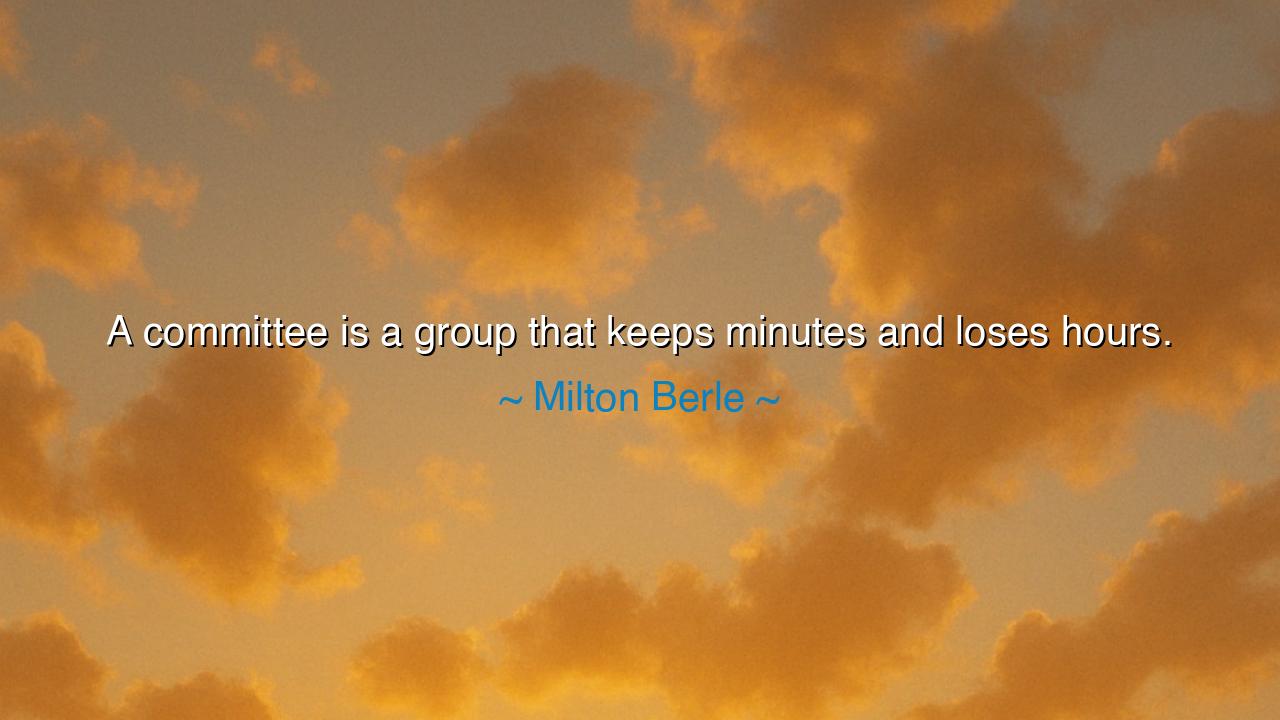
A committee is a group that keeps minutes and loses hours.






"A committee is a group that keeps minutes and loses hours." So spoke the American wit Milton Berle, a man whose laughter often carried the weight of truth. Beneath the jest, there lies a lament as old as civilization itself — the tragedy of many voices and little action, of councils that gather to speak much but move little. Berle’s words cut through the pretense of order and reveal the still heart at the center of bureaucracy: the sacred energy of time squandered in the name of procedure.
In the world of the ancients, time was sacred — the breath of the gods within mortal days. To waste time was not merely folly, but a sin against destiny itself. The elders of Greece knew this well. When the Spartans gathered in council, their speech was brief and their deeds swift. Yet across the sea, in the Athenian assemblies, men debated long into the night, their voices a river that sometimes ran in circles. Thus, wisdom teaches us that words without motion are like ships without wind — finely built, but forever anchored.
Think of the tale of the Roman Senate in its twilight days. There sat the wisest men of empire, clothed in togas, surrounded by marble and memory. They debated reforms, read reports, and wrote decrees — yet their empire burned while they deliberated. The barbarians were not at the gate; they were already within, and still the senators spoke of “committees” and “minutes.” They kept records of their meetings, yes — but they lost hours, days, and finally centuries of greatness to hesitation and pride.
Milton Berle, though he lived in a different age, spoke to this same eternal truth. His committee was not a Roman senate, but a boardroom — a modern amphitheater where time still dies beneath the slow weight of indecision. Each member notes, each clerk records, and yet the essence of purpose fades. For in every age, the greatest enemy of achievement is not ignorance, but the endless discussion that replaces doing.
Yet, let us not despise the gathering of minds. A committee, when born of unity and led by vision, can move mountains. When hearts beat together toward one goal, even the dullest meeting becomes a forge of destiny. Consider the Continental Congress of 1776 — thirteen voices, many arguments, but one flame. They too “kept minutes,” but their hours birthed a nation. The difference lies not in the form, but in the fire of purpose that burns within it.
So the lesson is clear, O reader: beware the fog of endless counsel. Speak, but swiftly; plan, but with action ready in your hand. Let your meetings be brief, your decisions strong, and your follow-through fierce. The minutes you save are the hours that build empires, paint masterpieces, and raise children who dream boldly.
In your own life, do not let committees — of others or of your own doubts — steal your days. When too many voices within you argue, listen to the one that calls you forward. Take the first step, even if it trembles. For life, like time, is a river that rewards those who move with it — not those who sit on its banks, writing minutes of what might have been.
Thus remember Berle’s jest as a warning wrapped in laughter. Keep your minutes short and your purpose long. Let not the world say of your life what he said of the committee — that it kept minutes, and lost the years.






AAdministratorAdministrator
Welcome, honored guests. Please leave a comment, we will respond soon